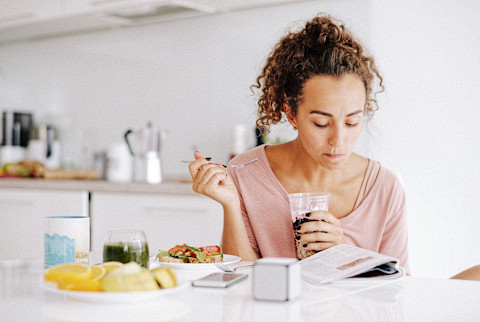Wait — Can Your Gut Health Affect Your Blood Sugar? This MD Says Yes

We talk about the gut a bunch around here, as your microbiome affects a variety of functions in your body—from your skin health to your immunity to your stress levels and overall mood. And now: your blood sugar. Well...potentially.
See, Stanford-trained physician Casey Means, M.D., co-founder of Levels, tells us that some people see rather intense blood sugar spikes from healthy, whole foods (like beans, oatmeal, and grapes). And on the mindbodygreen podcast, she declares poor gut health may be the reason why.
How your gut health can affect your blood sugar response.
Full disclosure: The research in this area is pretty limited. But the data we have is promising, says Means, who cites a 2015 study in the journal Cell1. In this experiment, researchers put continuous glucose monitors on 800 healthy participants and gave them the same meals in terms of composition (aka, the same ratio of carbs to fiber to protein), assuming they would respond exactly the same.
"You would think that they would all respond exactly the same because all the meals had the same number of carbohydrates in them," Means recounts. But actually, people had varying responses across the board—from no spikes to gigantic jumps. When the researchers took a look at which factors could predict these wildly different levels, they found that microbiome composition seemed to dictate those responses.
"[This] is not surprising," says Means. "The microbiome [does] a first pass on food. They're the ones who break down some of those early carbohydrates before it actually goes into the body." Perhaps that's why she can eat "a can of beans" and see no glucose response, while others eat one serving and find their blood sugar sky-high. "I think that people who are used to eating lots of plant fiber probably have microbiomes that tend to process it a little bit more favorably," she adds.
What to do about it.
The action item here, of course, is to prioritize your gut health. If not for your skin, for your immunity, or for your mood—then how about for your blood sugar? Support your microbiome by getting your fill of fiber and fermented foods, and feed those gut bacteria plenty of prebiotic staples—like asparagus, flaxseeds, artichoke, and jicama.
According to Means, it might not take long to see results. "My co-founder David [Flinner] started eating huge amounts of chia every morning to get his fiber in, and over the course of the month after eating all this fiber day after day, he found that he no longer responded as much to beans," she says.
The takeaway.
We need way more research to make a confident call, but Means has an inkling that your microbiome can affect your blood sugar response to certain healthy foods. Enhancing your gut health comes with some other renowned benefits, anyway, so it's not the worst mindset to have.

